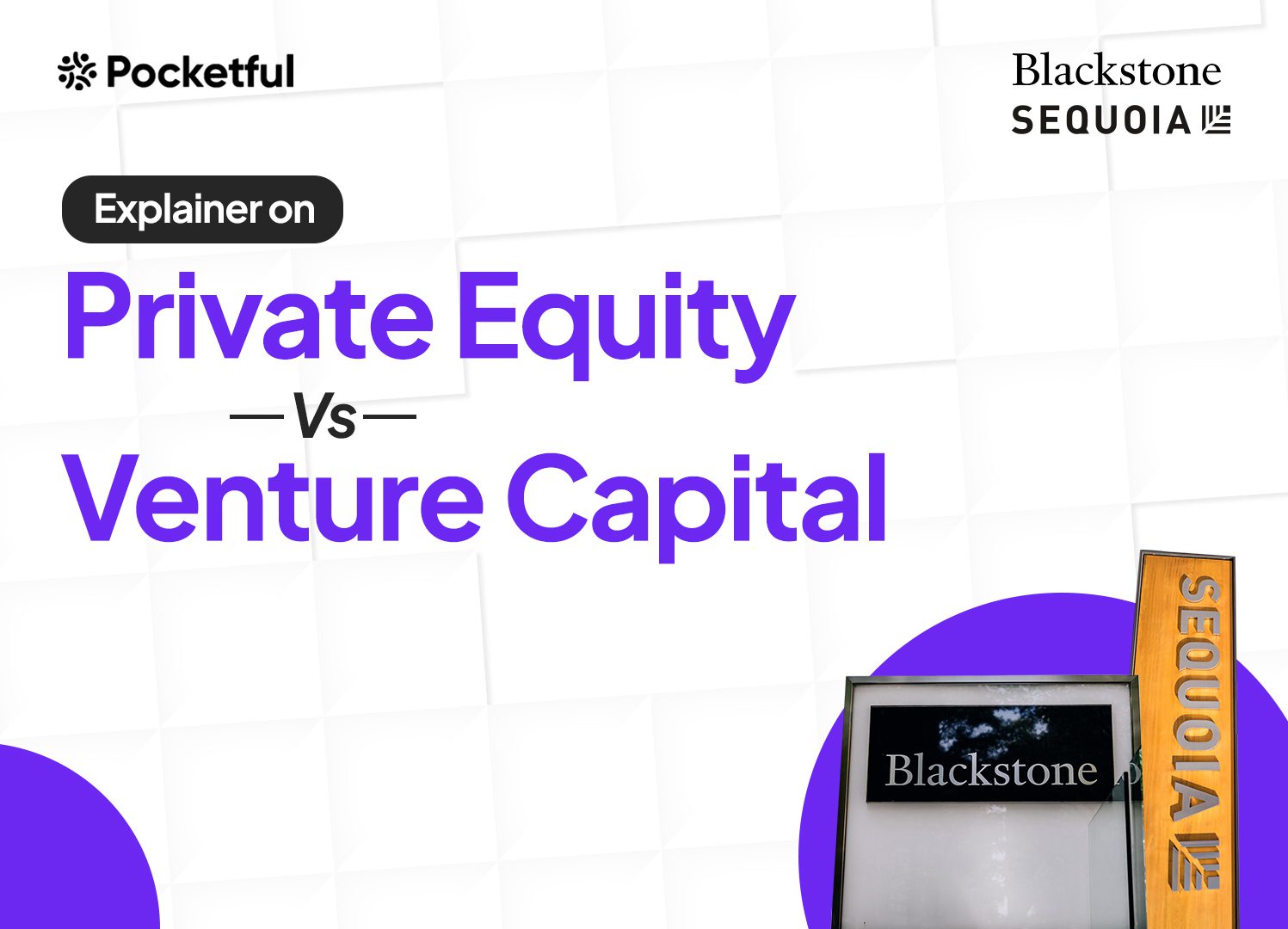| Type | Description | Contributor | Date |
|---|---|---|---|
| Post created | Pocketful Team | Apr-15-24 | |
| Add new links | Nisha | Mar-04-25 |

- Blog
- private equity vs venture capital
Explainer on Private Equity vs Venture Capital: Differences, Process, and Famous Firms

Did you ever wonder what the terms ‘venture capital’ and ‘private equity’ meant? This blog will explain these two investment powerhouses and their key differences.
So, whether you are a curious entrepreneur or an aspiring investor, this guide will shed light on the fascinating worlds of venture capital and private equity.
Overview of Private Equity vs Venture Capital
Private Equity
Private Equity refers to investments made in companies that are not publicly traded on stock exchanges. These firms raise capital from investors like pension funds, insurance companies, and high-net-worth individuals. The capital is then used to buy stakes in private companies, to improve their operations and profitability before selling them at a profit.
Process
The investment process of private equity firms is as follows,
- PE firms raise money from investors by creating a private equity fund. This fund has a specific investment strategy and a finite lifespan, generally 6-7 years.
- Once the fund is capitalised, the PE firm starts looking for investment opportunities. They look for companies with strong growth potential, sustainable competitive strength and a good management team.
- If a business is thought to be worth investing in, the PE firm will conduct thorough due diligence to analyse the company’s financial health, business model and market position.
- If the due diligence is satisfactory, the PE firm will negotiate the terms of investment with the company’s owners which involves acquiring a controlling stake in the company and providing growth capital.
- Once the investment is made, the PE firm will work with the company’s management team to improve its operations and profitability. This may involve implementing new strategies, restructuring the business, or making acquisitions.
- The PE firm’s ultimate goal is to exit the investment within the firm’s lifespan, which can be done through an IPO, a sale to another private equity firm, or a strategic sale to a trade buyer.

Venture Capital
Venture capital is a type of AIF (Alternative Investment Fund) that provides funding for startups and young companies with high growth potential. Unlike private equity, which focuses on established businesses, VC Firms essentially bet on ideas and innovation.
VC firms invest in startups at several stages,
- Seed Stage – The earliest stage of funding, often providing capital to help develop a prototype or test a new concept.
- Early stage – VCs fund startups that are validating their product-market fit and starting to gain traction.
- Growth Stage – Investing in companies that are looking to expand their operations.
Process
The investment process of Venture capital is as follows
– VC Funds raise money from limited partners (LPs) such as pension funds, insurance companies, and HNIs. These funds are used to invest in multiple startups while spreading out the risk.
– VC investments are generally smaller than PE deals. These firms receive equity ownership in the startup. This means that they share the profits of the company if successful.
– VC firms have a long investment horizon, i.e. 5 to 10 years, and look for an exit through either acquisition or IPO.
Private Equity vs Venture Capital
- Private Equity targets established, mid-stage or mature companies with existing revenue and profits and looks for businesses with turnaround potential. At the same time, venture capital often backs early-stage startups with high growth potential before they even have a proven product or market.
- Private Equity invests in more considerable sums and takes the majority stake in the companies they target. On the contrary, VC makes smaller investments spread across multiple startups to diversify risk. Since they are funding unproven ventures, these investments carry a higher risk of failure but are also eligible for high returns.
- While VC provides guidance and mentorship to young companies but generally does not take an operational role, PE firms are actively involved in managing the companies and bring in operational expertise to help restructure, streamline operations and improve the bottom line.

Read Also: SIP in Stocks vs SIP in Mutual funds?
Famous Firms
Below is a list of some of the famous Venture Capital and Private Equity firms in India.
Venture Capital Firms
- Sequoia Capital – is one of the most prominent VC firms globally. It has been instrumental in funding over 400 Indian startups, including Zomato, Ola, Oyo Rooms, BYJU’s, etc.
- Accel Partners – is another leading VC firm that has backed Indian startups like Flipkart, Myntra, and Swiggy at the seed, early, and growth stages. It has offices in California and San Francisco, and it has additional operating funds in London, India, and China. Accel was founded in 1983 by Arthur Patterson and James R. Swartz.
- Matrix Partners – is focused on early-growth stage companies. Matrix Partners has funded successful startups like Delhivery, Ola, etc. The firm was established in 2006.
- Kalaari Capital – it is an early-stage venture capital firm established in the year 2006 by Vani Kola and has been behind the success stories of several Indian startups like Snapdeal.
Private Equity Firms
- Blackstone India – A global PE giant, Blackstone invests across multiple sectors in India, including real estate, healthcare and consumer goods. In 1985, Peter G. Peterson and Stephen A. Schwarzman established Blackstone.
- Warburg Pincus – a private equity firm that has been investing in India since the 1990s. Some of Warburg’s investments include Ecom Express, Havells, Bharti Airtel, etc.
- Bain Capital – another private equity giant that has been investing in companies since 1984. It provides capital solutions to entrepreneurs, companies, and asset owners. It supports innovative businesses and accelerates growth.
- Carlyle Group – is a global PE major. The group focuses on mid-market and buyout investments in India. The firm was founded in Washington DC in 1987 by Bill Conway and David Rubenstein and has 28 offices across four continents.
Read Also: XIRR Vs CAGR: Investment Return Metrics
Conclusion
Private Equity and Venture Capital are both essential parts of the financial ecosystem. However, they serve distinct purposes. PE firms help existing businesses thrive, while VC firms nurture the next generation of industry leaders. PE firms act like business doctors, stepping in to improve and unlock the growth potential of established companies, while VC firms are startup champions, fuelling innovation by investing in companies at a nascent stage with disruptive ideas.
Frequently Asked Questions (FAQs)
What is the difference between Private Equity and Venture Capital?
PE invests in established firms for operational improvement, while VC backs early-stage startups.
Which is riskier, private equity or venture capital?
Venture capital is generally riskier as startups have fewer track records. Private Equity targets companies with a proven track record that is less risky.
How involved are PE and VC firms in the businesses they invest in?
PE firms are actively involved in managing the companies they own. VC firms provide guidance but do not participate in operational roles.
How long do VC and PE investments generally last?
Venture Capital investments last 5-10 years, and private equity investments last 3-5 years.
How can my startup become eligible for VC funding?
A strong team, a scalable business model, and a massive market opportunity are all vital in raising funds from VC firms.
Disclaimer
The securities, funds, and strategies discussed in this blog are provided for informational purposes only. They do not represent endorsements or recommendations. Investors should conduct their own research and seek professional advice before making any investment decisions.